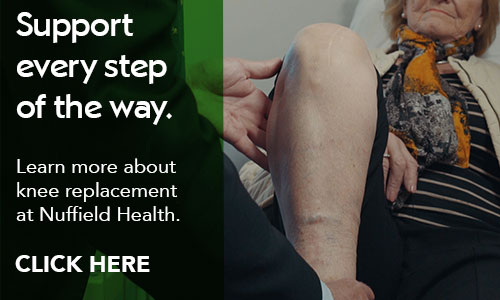4 signs you may need a knee replacement
- Overview
Knee osteoarthritis develops over time and can sneak up on you. When you do begin to experience symptoms, much of the damage may already be done. Here are some signs you shouldn’t ignore.
1. Pain points
Pain with activity
Knee pain manifests in many ways. Pain that comes on with activity and limits what you can do is a clear signal to seek help.
Delayed pain
Pain doesn’t have to stop you in your tracks to be serious. Pain that comes on after activity, also known as ‘payback pain’, can be a warning that your knee isn’t performing as it should.
Pain that interrupts sleep
If you find knee pain prevents you from falling asleep or you wake up because of pain caused by your movements during sleep – talk to someone about it.
2. Visual changes
The way your knee looks can be just as important as the way it feels. Changes in the appearance of your knee can be a sign of inflammation. If your leg swells, or looks markedly different from the other then it may be time to speak with a specialist.
3. Limited movement
Difficulty sitting down in a low seat such as in a car or cinema because your knee refuses to bend is a common sign of osteoarthritis. Seizing or catching of the joint during movement can also indicate advanced deterioration or that a loose bone fragment has become lodged in the joint.
4. Lifestyle limitations
It doesn’t matter if you want to climb a mountain or simply prune the garden - any symptom that prevents or limits your ability to do the things you love is cause for concern. With a little help, a bad knee doesn’t have to impact your quality of life.
When to see a professional
If knee pain is preventing you enjoying life and doing the things you love, talking with a professional can help you move forward.
Consider consulting a physiotherapist if your pain is severe and limiting your quality of life.
Most knee problems don’t require a full knee replacement. There are a number of treatments available, including physiotherapy and medication, which may better address your symptoms.
Our free 6-month Joint Pain Programme
The Nuffield Health Joint Pain Programme has helped thousands of people up and down the country find relief from chronic pain associated with arthritis and joint pain.
Our free-to-access programme will help you self-manage your chronic joint pain and lead a more independent life. The length of the programme is 6-months and included are 12 weeks of lifestyle advice and exercise sessions led by a Recovery Specialist.
The best part? It works. Feedback from those people who have completed the programme has shown us how it can help improve mobility, pain, general fitness levels and overall quality of life.
Fill in the form below and we'll get back to you within two working days. Thank you A member of the team will respond to you soon.
Also explore our joint health advice hub
Interested in knee replacement?
Last updated Thursday 10 August 2023
First published on Friday 5 February 2016


